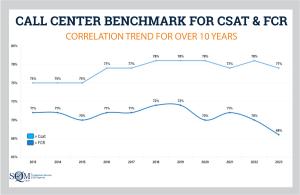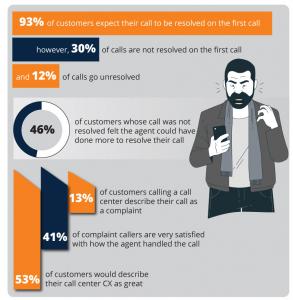
Executive Summary for the QA State of Industry Overall
Executive Summary for the QA State of Industry Overall
VERNON, BC, CANADA, January 30, 2024 /EINPresswire.com/ -- The state of the industry's call center customer service QA in 2023 can be characterized as the priorities remaining the same as in previous years for ensuring customer satisfaction (Csat), helping to achieve high customer journey sentiment, and call compliance adherence to government regulations and company processes.SQM Group's research shows that 95% of call centers use quality assurance and coaching to improve customer service.
Yet, very few call center managers can say they improved their Csat due to their QA practices. Furthermore, our research shows that 83% of agents believe their QA program does not help them improve Csat.
For 2023, the call center benchmark for the Csat score is 77% and remains relatively the same for the last 5 years. The Csat score represents the very satisfied customers (top box survey rating response) with the call center's overall customer service. The call center benchmark industry for First Call Resolution (FCR) score is 68% for 2023, down 4% since COVID-19.
The correlation of FCR to Csat remains high. In other words, when FCR goes up or down, so does Csat. However, a trend in recent years is that the gap between FCR and Csat has started to widen, mainly due to increased average handle time for handling more complex calls.
There's been a significant shift towards digital tools and software that automate various QA processes. This includes using advanced analytics, speech analytics, and automated scoring systems. These technologies help efficiently analyze large volumes of calls and provide detailed customer experience (CX) insights.
What has changed as a result of Artificial Intelligence (AI) is the ability to evaluate 100% of calls for call compliance adherence and customer sentiment. In addition, AI has started to replace QA evaluators for assessing calls.
It is expected that in the next few years, AI will displace the majority of QA evaluators for accessing customer interactions. For call centers currently using AI to automate their QA practices for evaluating agent handling of calls, only 4% monitor 100% of calls. Most call centers that evaluate agents using AI monitor 50% or less of the calls.
Interestingly, 69% of call centers do not use AI technology to evaluate agent calls. However, it is expected that call centers using AI to evaluate calls will significantly increase in the next few years. Moreover, more call center professionals believe AI is more effective for evaluating call compliance than customer service delivery.
The landscape of call center QA practices has evolved significantly in recent years, driven by AI technological advancements, changing customer expectations, and the growing complexity of customer interactions.
QA practices are becoming more customer-centric. Customer satisfaction metrics are emphasized more and have a higher QA weighting. Modern QA software allows real-time agent monitoring and feedback, enabling immediate corrective actions and agent self-coaching opportunities. This helps enhance agent performance on the fly rather than waiting for periodic review sessions.
With increasing government regulatory requirements and concerns about data privacy, QA practices now include stringent call compliance and security measures, especially in the finance and healthcare industries.
The rise of work-from-home agents has led to changes in how QA is conducted. This includes remote monitoring, agent self-coaching, and adapting QA practices to ensure quality in a decentralized work setting.
Furthermore, Customer Service QA is still important because it makes agents and managers accountable for delivering high customer service and identifying improvement opportunities for handling calls.
• The most significant Customer Service QA pain points:
• Improving customer satisfaction
• Increasing agent productivity Improving first call resolution
• Adherence to call compliance processes
• Reducing QA operating costs
Most call center QA professionals (e.g., supervisors, managers, QA evaluators, and analysts) believe that QA is essential for maintaining or improving customer service delivery and adherence to call compliance requirements. However, many of those same QA professionals believe that QA needs to improve or is broken.
Customer Service QA is essential because it can help improve CX problems (see attached infographic).
Read the full Customer Service QA: State of the Industry Benchmark Report 2023.
SQM Marketing
SQM Group Inc.
+1 800-446-2095
email us here
Visit us on social media:
Facebook
Twitter
LinkedIn
Other
EIN Presswire does not exercise editorial control over third-party content provided, uploaded, published, or distributed by users of EIN Presswire. We are a distributor, not a publisher, of 3rd party content. Such content may contain the views, opinions, statements, offers, and other material of the respective users, suppliers, participants, or authors.




